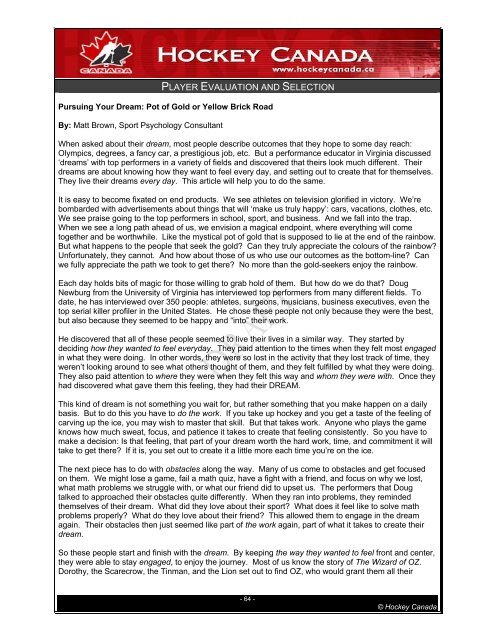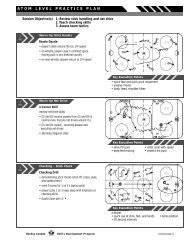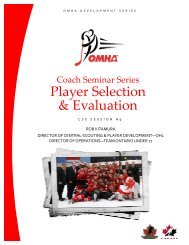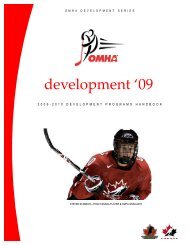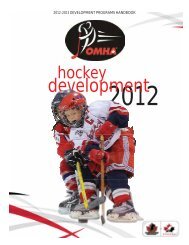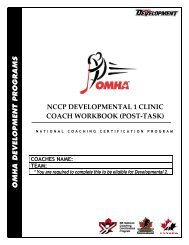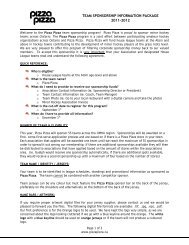Player Evaluation & Selection - Ontario Minor Hockey Association
Player Evaluation & Selection - Ontario Minor Hockey Association
Player Evaluation & Selection - Ontario Minor Hockey Association
Create successful ePaper yourself
Turn your PDF publications into a flip-book with our unique Google optimized e-Paper software.
PLAYER EVALUATION AND SELECTION<br />
Pursuing Your Dream: Pot of Gold or Yellow Brick Road<br />
By: Matt Brown, Sport Psychology Consultant<br />
When asked about their dream, most people describe outcomes that they hope to some day reach:<br />
Olympics, degrees, a fancy car, a prestigious job, etc. But a performance educator in Virginia discussed<br />
‘dreams’ with top performers in a variety of fields and discovered that theirs look much different. Their<br />
dreams are about knowing how they want to feel every day, and setting out to create that for themselves.<br />
They live their dreams every day. This article will help you to do the same.<br />
It is easy to become fixated on end products. We see athletes on television glorified in victory. We’re<br />
bombarded with advertisements about things that will ‘make us truly happy’: cars, vacations, clothes, etc.<br />
We see praise going to the top performers in school, sport, and business. And we fall into the trap.<br />
When we see a long path ahead of us, we envision a magical endpoint, where everything will come<br />
together and be worthwhile. Like the mystical pot of gold that is supposed to lie at the end of the rainbow.<br />
But what happens to the people that seek the gold? Can they truly appreciate the colours of the rainbow?<br />
Unfortunately, they cannot. And how about those of us who use our outcomes as the bottom-line? Can<br />
we fully appreciate the path we took to get there? No more than the gold-seekers enjoy the rainbow.<br />
Each day holds bits of magic for those willing to grab hold of them. But how do we do that? Doug<br />
Newburg from the University of Virginia has interviewed top performers from many different fields. To<br />
date, he has interviewed over 350 people: athletes, surgeons, musicians, business executives, even the<br />
top serial killer profiler in the United States. He chose these people not only because they were the best,<br />
but also because they seemed to be happy and “into” their work.<br />
He discovered that all of these people seemed to live their lives in a similar way. They started by<br />
deciding how they wanted to feel everyday. They paid attention to the times when they felt most engaged<br />
in what they were doing. In other words, they were so lost in the activity that they lost track of time, they<br />
weren’t looking around to see what others thought of them, and they felt fulfilled by what they were doing.<br />
They also paid attention to where they were when they felt this way and whom they were with. Once they<br />
had discovered what gave them this feeling, they had their DREAM.<br />
This kind of dream is not something you wait for, but rather something that you make happen on a daily<br />
basis. But to do this you have to do the work. If you take up hockey and you get a taste of the feeling of<br />
carving up the ice, you may wish to master that skill. But that takes work. Anyone who plays the game<br />
knows how much sweat, focus, and patience it takes to create that feeling consistently. So you have to<br />
make a decision: Is that feeling, that part of your dream worth the hard work, time, and commitment it will<br />
take to get there? If it is, you set out to create it a little more each time you’re on the ice.<br />
The next piece has to do with obstacles along the way. Many of us come to obstacles and get focused<br />
on them. We might lose a game, fail a math quiz, have a fight with a friend, and focus on why we lost,<br />
what math problems we struggle with, or what our friend did to upset us. The performers that Doug<br />
talked to approached their obstacles quite differently. When they ran into problems, they reminded<br />
themselves of their dream. What did they love about their sport? What does it feel like to solve math<br />
problems properly? What do they love about their friend? This allowed them to engage in the dream<br />
again. Their obstacles then just seemed like part of the work again, part of what it takes to create their<br />
dream.<br />
So these people start and finish with the dream. By keeping the way they wanted to feel front and center,<br />
they were able to stay engaged, to enjoy the journey. Most of us know the story of The Wizard of OZ.<br />
Dorothy, the Scarecrow, the Tinman, and the Lion set out to find OZ, who would grant them all their<br />
- 64 -<br />
© <strong>Hockey</strong> Canada


